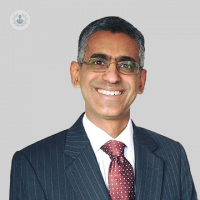Frequently asked questions about intraocular lenses
Written by:What are the different types of intraocular lenses available?
There are two different types of intraocular lenses which are available. The first type available are phakic lenses. They can be placed in the eye without having to take the eye’s natural lens out and are made of plastic or silicone.

The second type of lenses available are pseudophakic lenses. These are placed after the natural eye lens is removed. They can be implemented during cataract surgery.
Intraocular lenses are usually made from flexible and foldable material and are about the same size as the original lens. The lenses implanted are usually monofocal intraocular lenses. However, it is also possible for multifocal intraocular lenses or toric intraocular lenses to be implanted.
The intraocular lenses implantation procedure is normally carried out under local anaesthetic. It is a painless procedure which is performed on a day case basis. It is not necessary for the eye to be covered for a long period following the procedure.
Why would you choose to have intraocular lenses?
Intraocular lenses are often used in cases of cataracts or to correct other visual disorders such as short sight. The procedure does not heavily impact the patient, meaning they are able to a normal life shortly after surgery.
What does the procedure involve?
Intraocular lenses are implanted in the eye during cataract surgery in order to replace the natural lens. The eye's natural lens will be removed via an incision in the edge of the cornea and the new lens will be inserted via this incision.
How to prepare for the procedure
In order to prepare for the procedure, an ophthalmologist will run a series of tests to determine patient suitability and what the best option is according to their needs.
Post-operative care
The post-operative period is short, allowing the patient can return to normal life very quickly. The patient can continue with daily activities without any issues.
Complete bed rest is not necessary after the procedure. The patient only needs to take care to avoid trauma and they should apply eye drops. The application of the drops will depend on the procedure that has been done. They tend to be applied two to four times a day for a few weeks following the surgery.
If you would like to speak to Mr Subramaniam about intraocular lenses, you can book a consultation via his Top Doctors profile today.


